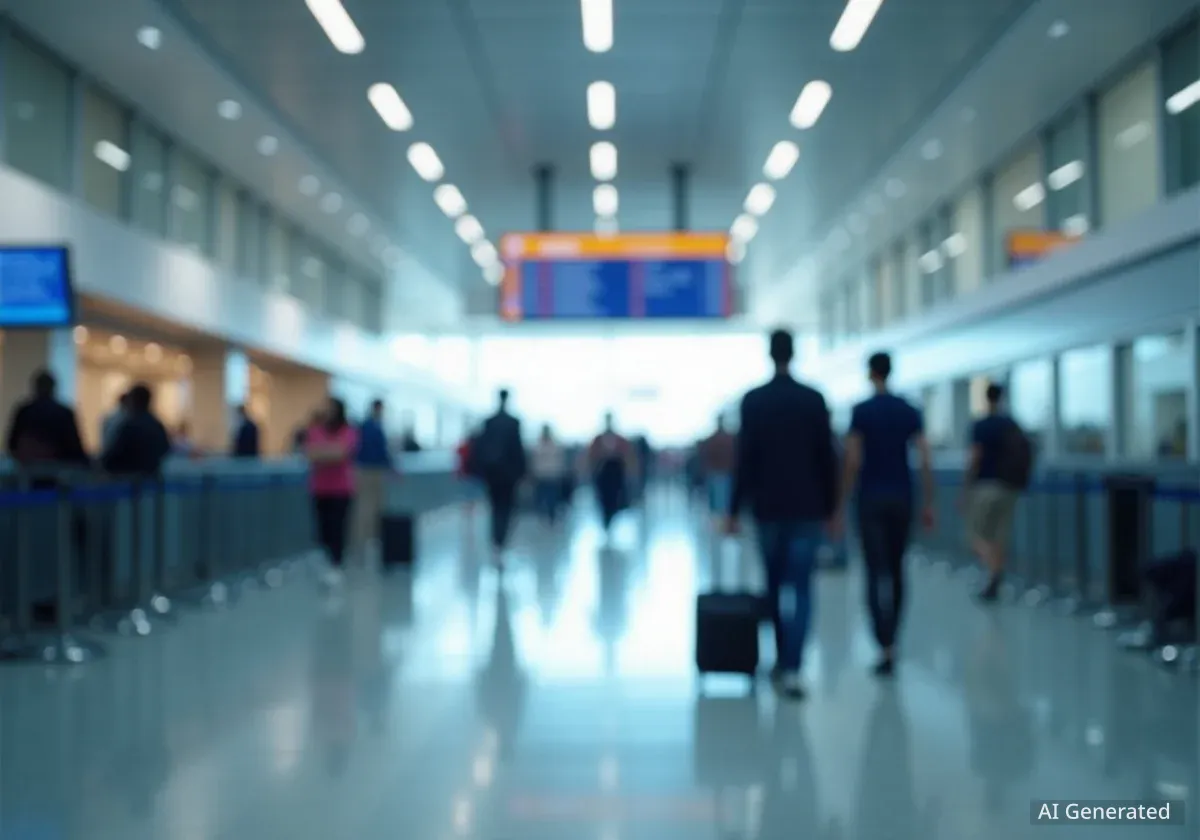An Air India flight bound for Delhi from London Heathrow Airport on Sunday, September 21, 2025, returned to its gate during taxiing. The aircraft had to turn back because a passenger, who had successfully scanned their boarding pass, did not board the plane. This incident led to a delay in the flight's departure.
Airport security protocols require an aircraft to return if a boarded passenger is not physically present on board. This ensures that no unaccompanied baggage remains on the flight, which is a critical safety measure.
Key Takeaways
- Air India flight AI 162 returned to the gate at London Heathrow.
- A passenger with a scanned boarding pass did not board the aircraft.
- The passenger mistakenly went to the arrivals area.
- Security protocols required the plane to offload the passenger's baggage.
- The incident caused a delay in the flight's departure.
Incident Details at London Heathrow
Flight AI 162 was scheduled to depart from London Heathrow (LHR) to Delhi (DEL). The aircraft had completed its pushback from the gate and was in the process of taxiing towards the runway for takeoff. During this phase, the flight crew discovered a discrepancy.
According to an Air India spokesperson, the crew realized that one individual, despite having their boarding pass scanned and being marked as 'boarded' in the system, was not on board the aircraft. This discovery triggered immediate action.
Passenger's Mistake Led to Delay
The passenger in question had made a navigational error after having their boarding pass scanned at the departure gate. Instead of proceeding to the aircraft, they mistakenly went into the arrivals area of the airport.
This error meant that while the system showed the passenger as having boarded, they were physically elsewhere. Such a situation is taken very seriously in aviation security, primarily due to the 'unaccompanied baggage' risk.
"Flight AI 162, operating from London (Heathrow) to Delhi on September 21, 2025 returned to the gate shortly after pushback because a passenger who, despite having their boarding pass scanned and being marked as boarded, failed to board the aircraft. The passenger had mistakenly proceeded to the arrivals area instead of the departure gate after having their boarding pass scanned at the gate," an Air India spokesperson said in a statement.
Security Protocols and Consequences
Aviation security regulations are strict regarding passengers and their luggage. If a passenger's baggage is loaded onto an aircraft, but the passenger themselves is not on board, the baggage must be removed. This protocol prevents potential security threats.
Therefore, the Air India flight had no option but to return to the gate. The primary reason for this return was to offload the baggage belonging to the passenger who did not board.
Aviation Security Fact
- Unaccompanied Baggage: International aviation rules mandate that if a passenger checks in baggage but does not board the flight, their luggage must be removed from the aircraft. This is a critical security measure to prevent dangerous items from being transported.
- Boarding Pass Scans: While a boarding pass scan indicates a passenger's intention to board, it does not confirm their physical presence on the aircraft. Manual checks and crew vigilance are also essential.
Investigation and Further Action
Upon the aircraft's return to the gate, airport security officials detained the passenger for questioning. This is a standard procedure when such incidents occur, to understand the circumstances and ensure no malicious intent was involved.
The Air India spokesperson confirmed the adherence to established procedures. "As per standard security protocols, the aircraft returned to offload the passenger's baggage and, subsequently, departed with a delay. The passenger was detained by the airport security officials for questioning."
Impact on Flight Operations
The incident caused a delay in the departure of Air India Flight AI 162. While the exact duration of the delay was not immediately specified, such events typically lead to delays ranging from one to several hours, depending on the time taken to locate and offload the baggage and re-prepare the aircraft for departure.
The airline expressed regret for the inconvenience caused to other passengers. "Our flight crew followed the necessary procedures, and the decision to return was made to ensure compliance with security regulations. We regret the delay in the flight's departure caused by this incident," the spokesperson added.
Context of Airport Security
Modern airport security systems are designed to track passengers and their baggage closely. However, human error, such as misdirection within a large airport terminal, can sometimes lead to discrepancies. When these discrepancies involve a passenger who has checked in but not boarded, security protocols prioritize safety above all else, requiring the aircraft to return.
Airlines and airports continuously work to minimize such incidents through clearer signage, announcements, and staff assistance, especially in busy hubs like London Heathrow, which handles millions of passengers annually.
Passenger Numbers Unconfirmed
The total number of passengers on board the Air India aircraft at the time of the incident was not immediately available. However, any delay impacts all passengers, regardless of the number, leading to missed connections or altered travel plans for many.
This incident highlights the importance of passengers paying close attention to gate announcements and directions, particularly in large and complex airport environments. It also underscores the rigorous security measures in place to safeguard air travel.
Travelers are always advised to allow ample time for transit through airports and to confirm their gate and boarding information multiple times to avoid similar issues.





